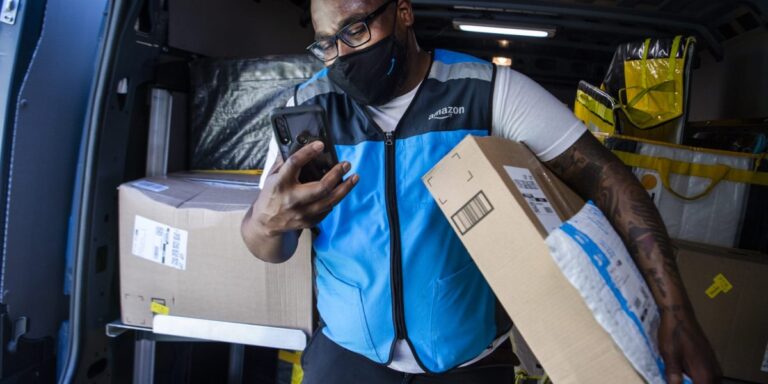
Thousands of delivery drivers have taken legal action against Amazon Tuesday, alleging that the company’s classification of them as independent contractors instead of employees led to unpaid wages and other financial losses.
Two law firms behind the action said that about 15,860 Amazon Flex drivers have submitted arbitration demands to the American Arbitration Association, where 453 similar cases are already pending.
Amazon’s Flex program, founded in 2015, recruits drivers to deliver packages with their own car and a special application.
The company presents the job as a flexible, part-time opportunity that allows people to earn extra income during the hours they choose. Most drivers earn between $18 and $25 an hour, according to Amazon, although how much they get paid can depend on other factors, such as their location and how long it takes to make deliveries.
The arbitration requests submitted Tuesday were filed by drivers in CaliforniaIllinois and Massachusetts, all of which have rules that limit the degree of control companies can operate on independent contractors. The claims, collected over a four-year period by attorneys Joseph Sellers and Steven Tindall, argue that the drivers should be classified as Amazon employees rather than independent contractors, based on laws in the three states.
The change would allow Flex drivers to collect unpaid wages because Amazon only pays them for a predetermined number of hours, regardless of how long it takes to make deliveries, lawyers say. It would also allow Flex drivers to receive overtime pay if they work more than 40 hours per week and get reimbursed for work-related expenses, such as gas costs and vehicle wear and tear.
Gas and other vehicle costs represent “a huge expense for our customers,” Tindall said in an interview. It also said a customer represented in the claims worked 7 days a week making deliveries for Amazon during a holiday period and was never paid overtime.
In a prepared statement, Amazon spokesperson Branden Baribeau touted the benefits of the Flex program, saying it gives “individuals the ability to set their own schedule and be their own boss, while while earning a competitive salary.
“Most Amazon Flex delivery partners tell us they appreciate the flexibility of the program, and we’re proud of the work they do every day on behalf of customers,” Baribeau said.
Tindall and Sellers say they have so far been successful in seven of the eight arbitration claims against Amazon that they have brought in court. The drivers they represented in these cases received an average of $9,000 in damages.
Amazon’s business model for its power workforce – made up of independent contractors and third party companies which allow the company to avoid unionization – faces intense scrutiny and challenges from different corners.
A bipartisan group of more than 30 U.S. senators sent a letter to Amazon CEO Andy Jassy last week, requesting more information about the company’s relationship with the thousands of independent businesses that make millions of deliveries each day under the Amazon program. Delivery Services Partner Program.
In March, the Wisconsin Supreme Court let stand a lower court decision which declared Flexible drivers to become employees – a decision that would allow them to be part of the state’s unemployment insurance system and entitled to unemployment compensation if they are fired.
THE Teamsters Unionwhich seeks to unionize Amazon drivers, also filed a complaint with the National Labor Relations Board last year challenging how the company classifies some of its drivers.


